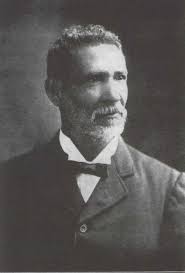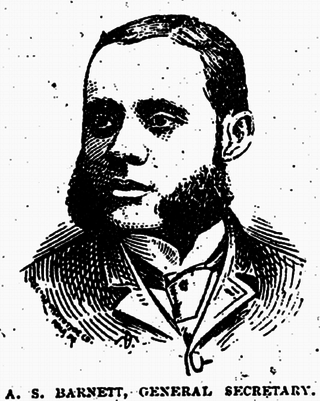John Andrew Singleton was a civil rights activist, dentist, and member of the Nebraska House of Representatives. He served as president of the Omaha, Nebraska, and then the Jamaica, New York, branches of the NAACP. He was an outspoken activist and received the nickname "the militant dentist" while living in Jamaica, New York.
Millard Filmore Singleton was an African-American political leader and civil servant in Omaha Nebraska. He was an officer in the Omaha Colored Republican Club and the Omaha branch of the National Afro-American League. He held posts as Justice of the Peace, storekeeper in the United States Internal Revenue Service, recorder of deeds for the city, and as bailiff of the municipal court.
John Albert Williams was a minister, journalist, and political activist in Omaha, Nebraska. He was born to an escaped slave and spoke from the pulpit and the newspapers on issues of civil rights, equality, and racial harmony. He was a highly respected minister, journalist, and civic leader. He served on many committees and boards among Omaha's black community and in the Omaha and Nebraska Episcopal Church.

Rodolphe Lucien Desdunes was a Louisiana Creole civil rights activist, poet, historian, journalist, and customs officer primarily active in New Orleans, Louisiana.

Daniel F. Desdunes was a civil rights activist and musician in New Orleans and Omaha, Nebraska. In 1892 he volunteered to board a train car designated for whites in violation of the Louisiana 1890 Separate Car Act. This would be a test case to enable the New Orleans Comité des Citoyens to challenge the law in the courts. The train he boarded was an interstate train, and the court found that the law did not apply to such cases, which were bound by federal law and regulation. Shortly thereafter, another member of the Comité des Citoyens, Homer Plessy, was selected to board an intrastate train. He was arrested for refusing to leave the white car, and what became known as Plessy vs Ferguson (1896) was litigated to the US Supreme Court.
Thomas P. Mahammitt was a journalist, caterer, civil rights activist, and civic leader from Omaha Nebraska. He was owner and editor for the black weekly, The Enterprise, Omaha's leading black paper at the turn of the 20th century. He was also an active leader in the Masons and the Boy Scouts and was named "Omaha's most distinguished Negro citizen" in 1934.

Ella Lillian Davis Browne Mahammitt was an American journalist, civil rights activist, and women's rights activist from Omaha, Nebraska. She was editor of the black weekly newspaper The Enterprise, president of Omaha's Colored Women's Club, and an officer of local branches of the Afro-American League. In 1895, she was vice-president of the National Federation of Afro-American Women, headed by Margaret James Murray, and in 1896 was a committee member of the successor organization, the National Association of Colored Women, under president Mary Church Terrell.

Edwin R. Overall aka Edwin R. Williams was an abolitionist, civil rights activist, civil servant, and politician in Chicago and Omaha. In the 1850s and 1860s, he was involved in abolition and underground railroad activities headed at Chicago's Quinn Chapel AME Church. During the U. S. Civil War, he recruited blacks in Chicago to join the Union Army. After the war, he moved to Omaha, where he was involved in the founding of the National Afro-American League and a local branch of the same. He was the first black in Nebraska to be nominated to the state legislature in 1890. He lost the election, but in 1892, his friend Matthew O. Ricketts became the first African-American elected to the Nebraska legislature. He was also a leader in Omaha organized labor.
Cyrus Dicks Bell was a journalist, civil rights activist, and civic leader in Omaha, Nebraska. He owned and edited the black newspaper Afro-American Sentinel during the 1890s. He was an outspoken political independent and later in his life became a strong supporter of Democrats. He was a founding member of the state Afro-American League and frequently spoke out against lynchings and about other issues of civil rights.
Ferdinand Lee Barnett was a journalist, civil rights activist, politician, and civil servant from Omaha, Nebraska. He was founder and editor of the newspaper The Progressive, which ran from 1889 to 1906 and served for a time as deputy clerk in the county court. He was elected to the Nebraska State House of Representatives in 1926.

Alfred S. Barnett was an American journalist and civil rights activist in Omaha, Nebraska, Des Moines, Iowa, and Chicago, Illinois. In Des Moines, Barnett created and ran the newspaper, The Weekly Avalanche from 1891 to 1894. Before moving to Des Moines, he contributed to his brother, Ferdinand L. Barnett's Omaha paper, The Progress. He worked for civil rights also a member and an officer of numerous civil rights organizations, including the Nebraska branch of the National Afro-American League and the Afro-American Protective Association of Iowa. Barnett was described as a "pleasing speaker".
George F. Franklin was a journalist and civic leader in Omaha, Nebraska, and Denver, Colorado. He owned and published two African-American newspapers, The Enterprise in Omaha, and The Denver Star in Denver. He was active in civil rights and was a member of the Nebraska branch of the National Afro-American League.

The history of African-Americans in Omaha in the 19th Century begins with "York", a slave belonging to William Clark of the Lewis and Clark Expedition who came through the area in 1804, before the city existed. African-Americans have lived in the Omaha area since at least 1819, when fur traders lived in the area.
W. H. C. Stephenson was a doctor, preacher, and civil rights activist in Virginia City, Nevada, and Omaha, Nebraska. He was probably the first black doctor in Nevada and worked for the rights of blacks in that city. He was noted for his efforts in support of black suffrage in Nevada at the passing of the Fifteenth Amendment in 1870. He helped found the first Baptist church in Virginia City. He moved to Omaha in the late 1870s and continued his medical, religious, and civil rights work. He founded another Baptist church in Omaha, and was a prominent Republican and activist in the city.
James S. Bryant was a journalist and civil rights activist in Omaha, Nebraska. He worked with Ferdinand L. Barnett on his paper, The Progress in the 1890s.
Victor B. Walker was an American soldier, political activist, lawyer, civil rights activist, police officer, saloon owner, journalist, and gangster in the Old West, particularly in Omaha, Nebraska, and in Denver, Colorado, at the end of the 19th and beginning of the 20th century. Before coming to Omaha, he was a Buffalo soldier on the frontier, and when he first arrived in the city, he worked as a police officer. For a short time, he owned the Omaha saloon, The Midway, a center of gambling and criminal activity in the city. As well as a working as defense lawyer, he worked for civil rights and was a member of the Omaha Afro-American League, a civil rights organization in the city.

Ophelia Clenlans was a civil rights activist and journalist from Omaha, Nebraska.
Emmanuel S. Clenlans was an American civil rights activist and postal worker in Omaha, Nebraska. Clenlans was born about 1841 in Washington, DC. He married a woman named Ophelia and they had a daughter named Laura . In 1876, Clenlans was a part of the Nebraska Convention of Colored Americans, where he was on the committee on resolutions, and in 1879, Clenlans was a part of a meeting organized by Cyrus D. Bell with Dr. W. H. C. Stephenson, chair and Clenlans, secretary to express the political views of the Omaha black community. H. W. Coesley, Bell, and Gabriel Young played prominent committee roles in the meeting. The meeting passed resolutions against the unilateral support of blacks to the Republican party. In spite of this, he was a delegate to the state Republican convention in 1888. In 1890, he was a part of the forming of the Nebraska branch of the National Afro-American League, and was part of the committee that wrote the constitution of the state branch.
William R. Gamble was a civil rights activist and barber in Lincoln, Nebraska and Omaha, Nebraska. Gamble was born a slave in Mobile, Alabama in about 1850. His wife, Eveline, had French-Canadian and Native American ancestry. They were married in Lincoln, Nebraska in 1873 and moved to Omaha, Nebraska around 1880. They had eight children. Gamble's oldest daughter Lucinda became Omaha's first black school teacher and eventually married Father John Albert Williams, serving as an active community leader in North Omaha throughout her life. His other children were William, Richard Joseph, Edward, Leonard, Fred, Mary, and George. Gamble died on April 16, 1910.
African Americans in Nebraska or Black Nebraskans are residents of the state of Nebraska who are of African American ancestry. With history in Nebraska from the Lewis and Clark Expedition through the Civil War, emancipation, the Reconstruction era, resurgence of white supremacy with the Ku Klux Klan and Jim Crow Laws, the Civil Right movement, into current times, African Americans have contributed vastly to the economics, culture, and substance of the state.







